Enterprise, Innovation, and Support Agencies: An Entrepreneurial View
VerifiedAdded on 2023/06/18
|11
|3719
|142
Report
AI Summary
This report delves into the core concepts of enterprise and innovation within the realm of entrepreneurship. It examines the essential skills and characteristics that entrepreneurs need to succeed, alongside the motivations and behavioral traits that drive typical entrepreneurial behavior. The report identifies and discusses various barriers entrepreneurs face when launching a startup, such as lack of funds, knowledge, and poor decision-making. Furthermore, it explores methods for researching and evaluating business ideas, including financial feasibility analysis, SWOT analysis, and market analysis. The report also reviews local business support agencies in the UK, such as Solent Futures and Enterprise First, highlighting their roles in providing resources, financial aid, and networking opportunities. Finally, it discusses the advantages and disadvantages of the 'life-world' of the entrepreneur, weighing the flexibility and control against the pressures and challenges of maintaining work-life balance.

Individual report
1
1
Paraphrase This Document
Need a fresh take? Get an instant paraphrase of this document with our AI Paraphraser

Table of Contents
INTRODUCTION ..........................................................................................................................3
Section 1...........................................................................................................................................3
Section 2...........................................................................................................................................5
Section 3...........................................................................................................................................6
Section 4...........................................................................................................................................9
CONCLUSION .............................................................................................................................10
REFERENCES..............................................................................................................................11
2
INTRODUCTION ..........................................................................................................................3
Section 1...........................................................................................................................................3
Section 2...........................................................................................................................................5
Section 3...........................................................................................................................................6
Section 4...........................................................................................................................................9
CONCLUSION .............................................................................................................................10
REFERENCES..............................................................................................................................11
2
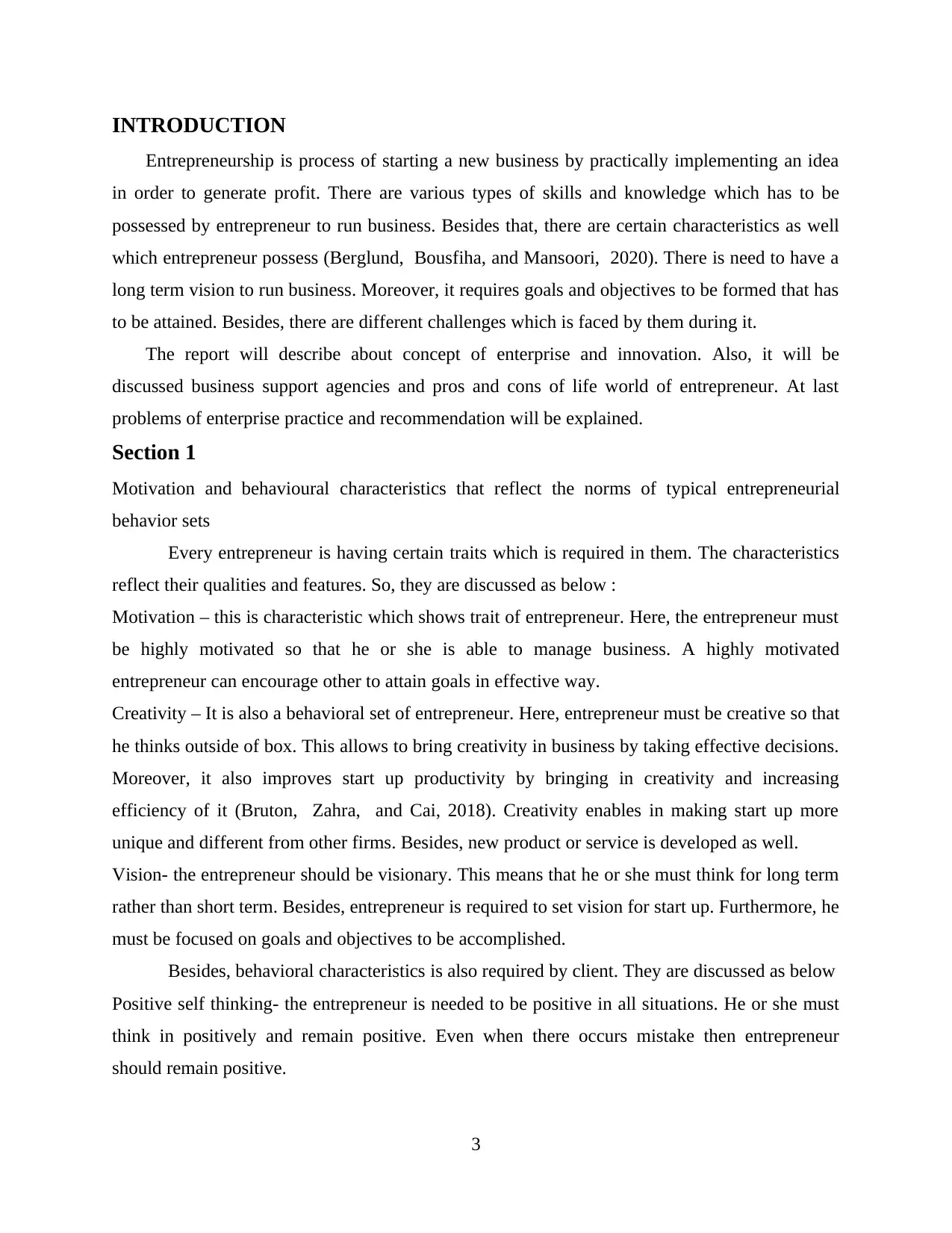
INTRODUCTION
Entrepreneurship is process of starting a new business by practically implementing an idea
in order to generate profit. There are various types of skills and knowledge which has to be
possessed by entrepreneur to run business. Besides that, there are certain characteristics as well
which entrepreneur possess (Berglund, Bousfiha, and Mansoori, 2020). There is need to have a
long term vision to run business. Moreover, it requires goals and objectives to be formed that has
to be attained. Besides, there are different challenges which is faced by them during it.
The report will describe about concept of enterprise and innovation. Also, it will be
discussed business support agencies and pros and cons of life world of entrepreneur. At last
problems of enterprise practice and recommendation will be explained.
Section 1
Motivation and behavioural characteristics that reflect the norms of typical entrepreneurial
behavior sets
Every entrepreneur is having certain traits which is required in them. The characteristics
reflect their qualities and features. So, they are discussed as below :
Motivation – this is characteristic which shows trait of entrepreneur. Here, the entrepreneur must
be highly motivated so that he or she is able to manage business. A highly motivated
entrepreneur can encourage other to attain goals in effective way.
Creativity – It is also a behavioral set of entrepreneur. Here, entrepreneur must be creative so that
he thinks outside of box. This allows to bring creativity in business by taking effective decisions.
Moreover, it also improves start up productivity by bringing in creativity and increasing
efficiency of it (Bruton, Zahra, and Cai, 2018). Creativity enables in making start up more
unique and different from other firms. Besides, new product or service is developed as well.
Vision- the entrepreneur should be visionary. This means that he or she must think for long term
rather than short term. Besides, entrepreneur is required to set vision for start up. Furthermore, he
must be focused on goals and objectives to be accomplished.
Besides, behavioral characteristics is also required by client. They are discussed as below
Positive self thinking- the entrepreneur is needed to be positive in all situations. He or she must
think in positively and remain positive. Even when there occurs mistake then entrepreneur
should remain positive.
3
Entrepreneurship is process of starting a new business by practically implementing an idea
in order to generate profit. There are various types of skills and knowledge which has to be
possessed by entrepreneur to run business. Besides that, there are certain characteristics as well
which entrepreneur possess (Berglund, Bousfiha, and Mansoori, 2020). There is need to have a
long term vision to run business. Moreover, it requires goals and objectives to be formed that has
to be attained. Besides, there are different challenges which is faced by them during it.
The report will describe about concept of enterprise and innovation. Also, it will be
discussed business support agencies and pros and cons of life world of entrepreneur. At last
problems of enterprise practice and recommendation will be explained.
Section 1
Motivation and behavioural characteristics that reflect the norms of typical entrepreneurial
behavior sets
Every entrepreneur is having certain traits which is required in them. The characteristics
reflect their qualities and features. So, they are discussed as below :
Motivation – this is characteristic which shows trait of entrepreneur. Here, the entrepreneur must
be highly motivated so that he or she is able to manage business. A highly motivated
entrepreneur can encourage other to attain goals in effective way.
Creativity – It is also a behavioral set of entrepreneur. Here, entrepreneur must be creative so that
he thinks outside of box. This allows to bring creativity in business by taking effective decisions.
Moreover, it also improves start up productivity by bringing in creativity and increasing
efficiency of it (Bruton, Zahra, and Cai, 2018). Creativity enables in making start up more
unique and different from other firms. Besides, new product or service is developed as well.
Vision- the entrepreneur should be visionary. This means that he or she must think for long term
rather than short term. Besides, entrepreneur is required to set vision for start up. Furthermore, he
must be focused on goals and objectives to be accomplished.
Besides, behavioral characteristics is also required by client. They are discussed as below
Positive self thinking- the entrepreneur is needed to be positive in all situations. He or she must
think in positively and remain positive. Even when there occurs mistake then entrepreneur
should remain positive.
3
⊘ This is a preview!⊘
Do you want full access?
Subscribe today to unlock all pages.

Trusted by 1+ million students worldwide
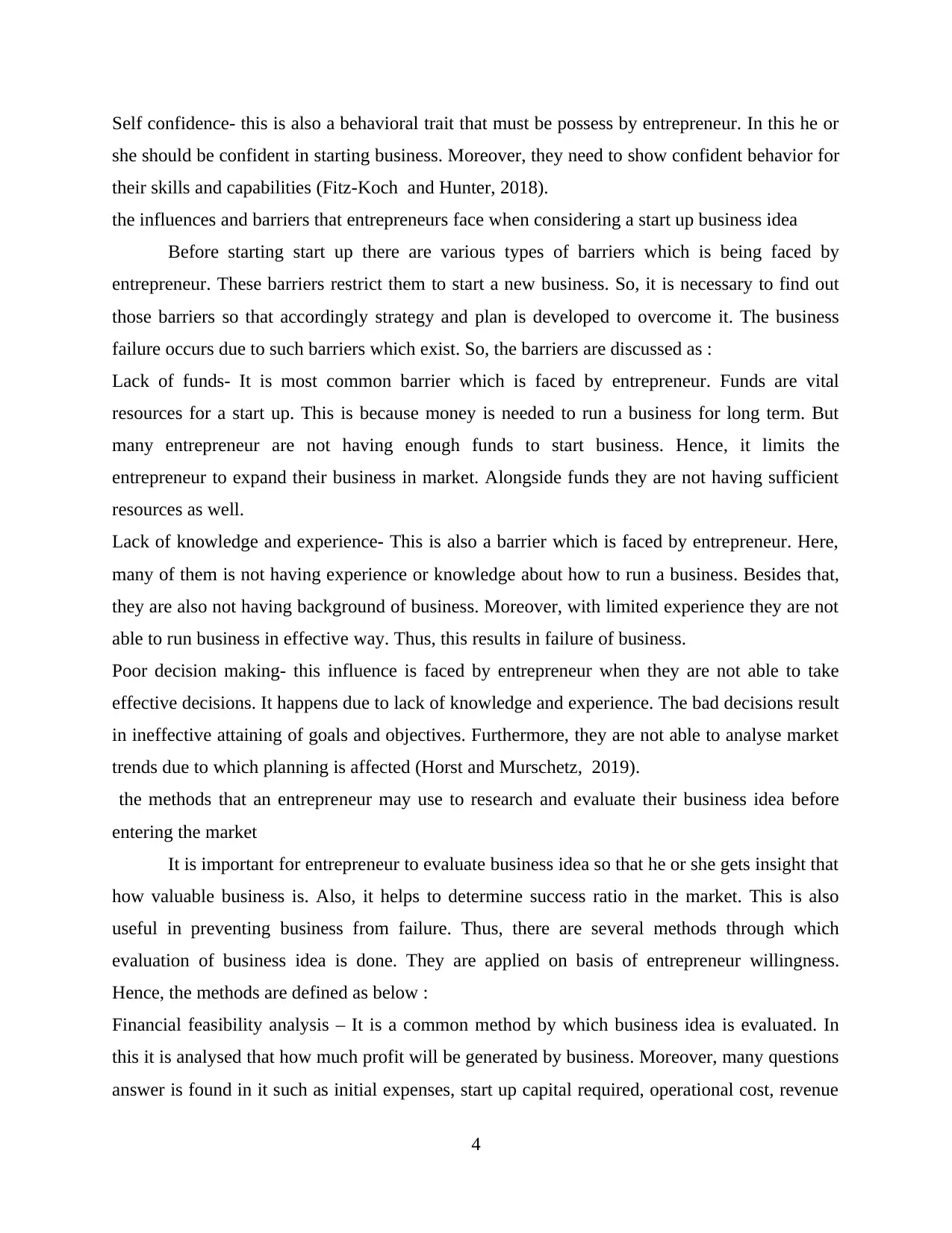
Self confidence- this is also a behavioral trait that must be possess by entrepreneur. In this he or
she should be confident in starting business. Moreover, they need to show confident behavior for
their skills and capabilities (Fitz-Koch and Hunter, 2018).
the influences and barriers that entrepreneurs face when considering a start up business idea
Before starting start up there are various types of barriers which is being faced by
entrepreneur. These barriers restrict them to start a new business. So, it is necessary to find out
those barriers so that accordingly strategy and plan is developed to overcome it. The business
failure occurs due to such barriers which exist. So, the barriers are discussed as :
Lack of funds- It is most common barrier which is faced by entrepreneur. Funds are vital
resources for a start up. This is because money is needed to run a business for long term. But
many entrepreneur are not having enough funds to start business. Hence, it limits the
entrepreneur to expand their business in market. Alongside funds they are not having sufficient
resources as well.
Lack of knowledge and experience- This is also a barrier which is faced by entrepreneur. Here,
many of them is not having experience or knowledge about how to run a business. Besides that,
they are also not having background of business. Moreover, with limited experience they are not
able to run business in effective way. Thus, this results in failure of business.
Poor decision making- this influence is faced by entrepreneur when they are not able to take
effective decisions. It happens due to lack of knowledge and experience. The bad decisions result
in ineffective attaining of goals and objectives. Furthermore, they are not able to analyse market
trends due to which planning is affected (Horst and Murschetz, 2019).
the methods that an entrepreneur may use to research and evaluate their business idea before
entering the market
It is important for entrepreneur to evaluate business idea so that he or she gets insight that
how valuable business is. Also, it helps to determine success ratio in the market. This is also
useful in preventing business from failure. Thus, there are several methods through which
evaluation of business idea is done. They are applied on basis of entrepreneur willingness.
Hence, the methods are defined as below :
Financial feasibility analysis – It is a common method by which business idea is evaluated. In
this it is analysed that how much profit will be generated by business. Moreover, many questions
answer is found in it such as initial expenses, start up capital required, operational cost, revenue
4
she should be confident in starting business. Moreover, they need to show confident behavior for
their skills and capabilities (Fitz-Koch and Hunter, 2018).
the influences and barriers that entrepreneurs face when considering a start up business idea
Before starting start up there are various types of barriers which is being faced by
entrepreneur. These barriers restrict them to start a new business. So, it is necessary to find out
those barriers so that accordingly strategy and plan is developed to overcome it. The business
failure occurs due to such barriers which exist. So, the barriers are discussed as :
Lack of funds- It is most common barrier which is faced by entrepreneur. Funds are vital
resources for a start up. This is because money is needed to run a business for long term. But
many entrepreneur are not having enough funds to start business. Hence, it limits the
entrepreneur to expand their business in market. Alongside funds they are not having sufficient
resources as well.
Lack of knowledge and experience- This is also a barrier which is faced by entrepreneur. Here,
many of them is not having experience or knowledge about how to run a business. Besides that,
they are also not having background of business. Moreover, with limited experience they are not
able to run business in effective way. Thus, this results in failure of business.
Poor decision making- this influence is faced by entrepreneur when they are not able to take
effective decisions. It happens due to lack of knowledge and experience. The bad decisions result
in ineffective attaining of goals and objectives. Furthermore, they are not able to analyse market
trends due to which planning is affected (Horst and Murschetz, 2019).
the methods that an entrepreneur may use to research and evaluate their business idea before
entering the market
It is important for entrepreneur to evaluate business idea so that he or she gets insight that
how valuable business is. Also, it helps to determine success ratio in the market. This is also
useful in preventing business from failure. Thus, there are several methods through which
evaluation of business idea is done. They are applied on basis of entrepreneur willingness.
Hence, the methods are defined as below :
Financial feasibility analysis – It is a common method by which business idea is evaluated. In
this it is analysed that how much profit will be generated by business. Moreover, many questions
answer is found in it such as initial expenses, start up capital required, operational cost, revenue
4
Paraphrase This Document
Need a fresh take? Get an instant paraphrase of this document with our AI Paraphraser
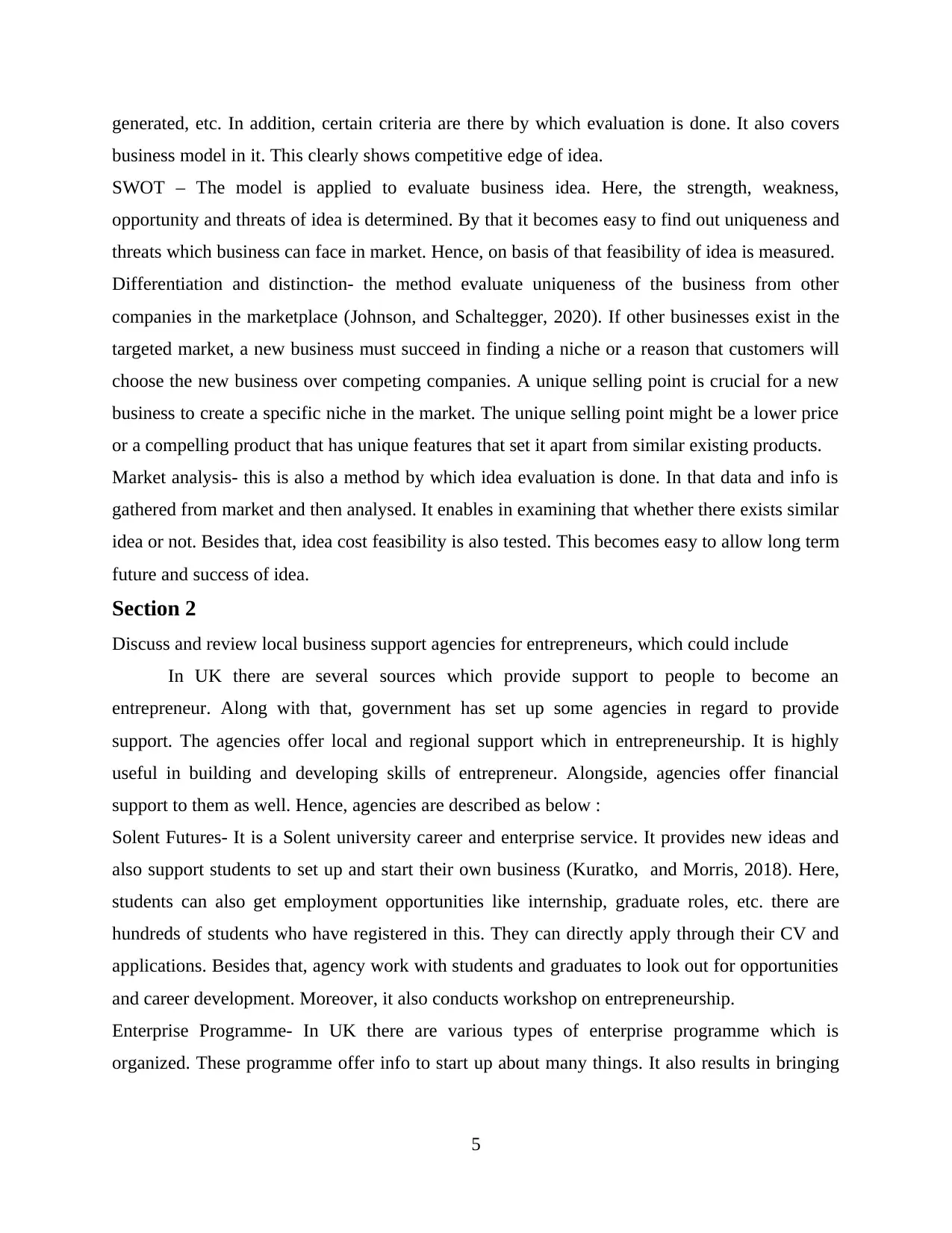
generated, etc. In addition, certain criteria are there by which evaluation is done. It also covers
business model in it. This clearly shows competitive edge of idea.
SWOT – The model is applied to evaluate business idea. Here, the strength, weakness,
opportunity and threats of idea is determined. By that it becomes easy to find out uniqueness and
threats which business can face in market. Hence, on basis of that feasibility of idea is measured.
Differentiation and distinction- the method evaluate uniqueness of the business from other
companies in the marketplace (Johnson, and Schaltegger, 2020). If other businesses exist in the
targeted market, a new business must succeed in finding a niche or a reason that customers will
choose the new business over competing companies. A unique selling point is crucial for a new
business to create a specific niche in the market. The unique selling point might be a lower price
or a compelling product that has unique features that set it apart from similar existing products.
Market analysis- this is also a method by which idea evaluation is done. In that data and info is
gathered from market and then analysed. It enables in examining that whether there exists similar
idea or not. Besides that, idea cost feasibility is also tested. This becomes easy to allow long term
future and success of idea.
Section 2
Discuss and review local business support agencies for entrepreneurs, which could include
In UK there are several sources which provide support to people to become an
entrepreneur. Along with that, government has set up some agencies in regard to provide
support. The agencies offer local and regional support which in entrepreneurship. It is highly
useful in building and developing skills of entrepreneur. Alongside, agencies offer financial
support to them as well. Hence, agencies are described as below :
Solent Futures- It is a Solent university career and enterprise service. It provides new ideas and
also support students to set up and start their own business (Kuratko, and Morris, 2018). Here,
students can also get employment opportunities like internship, graduate roles, etc. there are
hundreds of students who have registered in this. They can directly apply through their CV and
applications. Besides that, agency work with students and graduates to look out for opportunities
and career development. Moreover, it also conducts workshop on entrepreneurship.
Enterprise Programme- In UK there are various types of enterprise programme which is
organized. These programme offer info to start up about many things. It also results in bringing
5
business model in it. This clearly shows competitive edge of idea.
SWOT – The model is applied to evaluate business idea. Here, the strength, weakness,
opportunity and threats of idea is determined. By that it becomes easy to find out uniqueness and
threats which business can face in market. Hence, on basis of that feasibility of idea is measured.
Differentiation and distinction- the method evaluate uniqueness of the business from other
companies in the marketplace (Johnson, and Schaltegger, 2020). If other businesses exist in the
targeted market, a new business must succeed in finding a niche or a reason that customers will
choose the new business over competing companies. A unique selling point is crucial for a new
business to create a specific niche in the market. The unique selling point might be a lower price
or a compelling product that has unique features that set it apart from similar existing products.
Market analysis- this is also a method by which idea evaluation is done. In that data and info is
gathered from market and then analysed. It enables in examining that whether there exists similar
idea or not. Besides that, idea cost feasibility is also tested. This becomes easy to allow long term
future and success of idea.
Section 2
Discuss and review local business support agencies for entrepreneurs, which could include
In UK there are several sources which provide support to people to become an
entrepreneur. Along with that, government has set up some agencies in regard to provide
support. The agencies offer local and regional support which in entrepreneurship. It is highly
useful in building and developing skills of entrepreneur. Alongside, agencies offer financial
support to them as well. Hence, agencies are described as below :
Solent Futures- It is a Solent university career and enterprise service. It provides new ideas and
also support students to set up and start their own business (Kuratko, and Morris, 2018). Here,
students can also get employment opportunities like internship, graduate roles, etc. there are
hundreds of students who have registered in this. They can directly apply through their CV and
applications. Besides that, agency work with students and graduates to look out for opportunities
and career development. Moreover, it also conducts workshop on entrepreneurship.
Enterprise Programme- In UK there are various types of enterprise programme which is
organized. These programme offer info to start up about many things. It also results in bringing
5
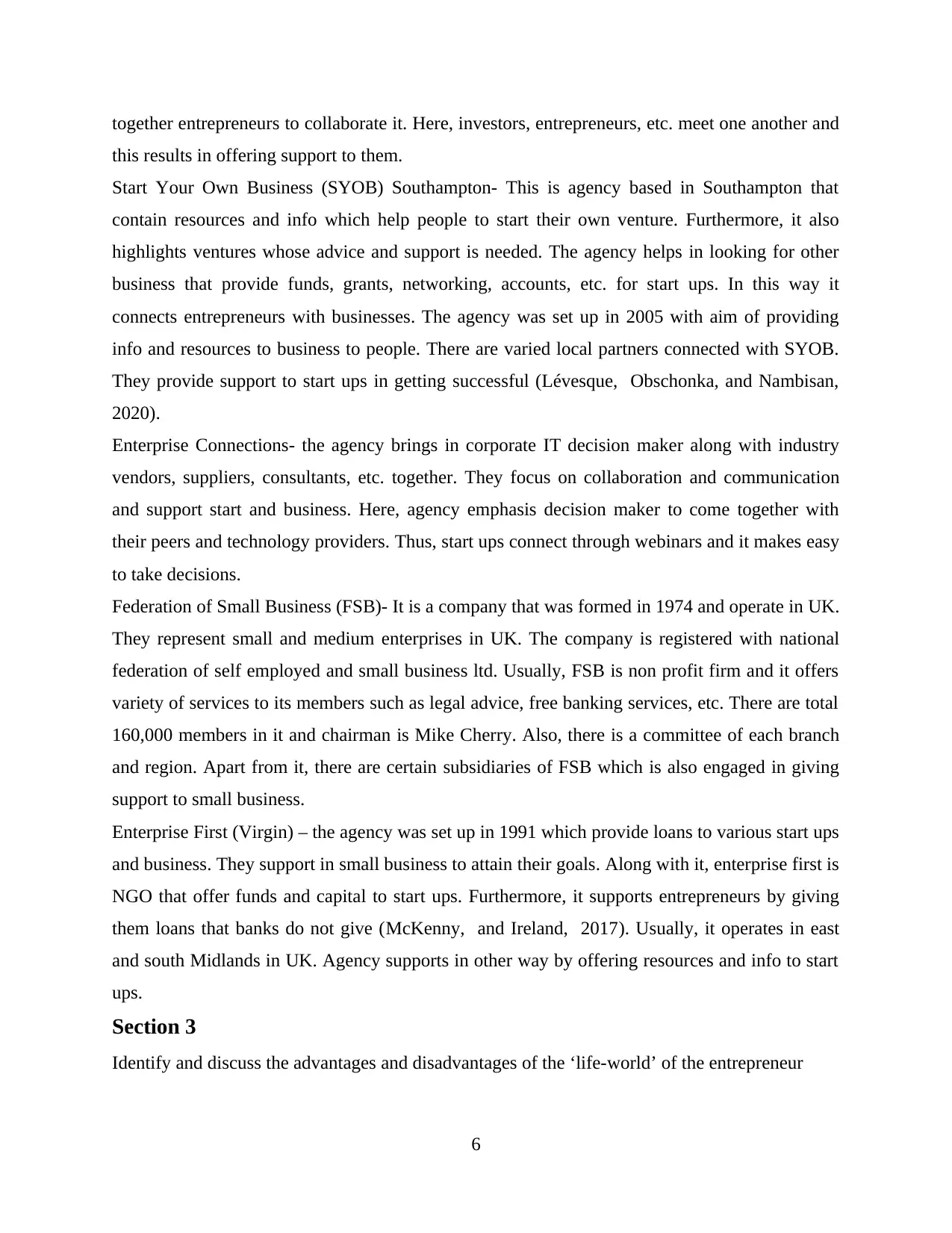
together entrepreneurs to collaborate it. Here, investors, entrepreneurs, etc. meet one another and
this results in offering support to them.
Start Your Own Business (SYOB) Southampton- This is agency based in Southampton that
contain resources and info which help people to start their own venture. Furthermore, it also
highlights ventures whose advice and support is needed. The agency helps in looking for other
business that provide funds, grants, networking, accounts, etc. for start ups. In this way it
connects entrepreneurs with businesses. The agency was set up in 2005 with aim of providing
info and resources to business to people. There are varied local partners connected with SYOB.
They provide support to start ups in getting successful (Lévesque, Obschonka, and Nambisan,
2020).
Enterprise Connections- the agency brings in corporate IT decision maker along with industry
vendors, suppliers, consultants, etc. together. They focus on collaboration and communication
and support start and business. Here, agency emphasis decision maker to come together with
their peers and technology providers. Thus, start ups connect through webinars and it makes easy
to take decisions.
Federation of Small Business (FSB)- It is a company that was formed in 1974 and operate in UK.
They represent small and medium enterprises in UK. The company is registered with national
federation of self employed and small business ltd. Usually, FSB is non profit firm and it offers
variety of services to its members such as legal advice, free banking services, etc. There are total
160,000 members in it and chairman is Mike Cherry. Also, there is a committee of each branch
and region. Apart from it, there are certain subsidiaries of FSB which is also engaged in giving
support to small business.
Enterprise First (Virgin) – the agency was set up in 1991 which provide loans to various start ups
and business. They support in small business to attain their goals. Along with it, enterprise first is
NGO that offer funds and capital to start ups. Furthermore, it supports entrepreneurs by giving
them loans that banks do not give (McKenny, and Ireland, 2017). Usually, it operates in east
and south Midlands in UK. Agency supports in other way by offering resources and info to start
ups.
Section 3
Identify and discuss the advantages and disadvantages of the ‘life-world’ of the entrepreneur
6
this results in offering support to them.
Start Your Own Business (SYOB) Southampton- This is agency based in Southampton that
contain resources and info which help people to start their own venture. Furthermore, it also
highlights ventures whose advice and support is needed. The agency helps in looking for other
business that provide funds, grants, networking, accounts, etc. for start ups. In this way it
connects entrepreneurs with businesses. The agency was set up in 2005 with aim of providing
info and resources to business to people. There are varied local partners connected with SYOB.
They provide support to start ups in getting successful (Lévesque, Obschonka, and Nambisan,
2020).
Enterprise Connections- the agency brings in corporate IT decision maker along with industry
vendors, suppliers, consultants, etc. together. They focus on collaboration and communication
and support start and business. Here, agency emphasis decision maker to come together with
their peers and technology providers. Thus, start ups connect through webinars and it makes easy
to take decisions.
Federation of Small Business (FSB)- It is a company that was formed in 1974 and operate in UK.
They represent small and medium enterprises in UK. The company is registered with national
federation of self employed and small business ltd. Usually, FSB is non profit firm and it offers
variety of services to its members such as legal advice, free banking services, etc. There are total
160,000 members in it and chairman is Mike Cherry. Also, there is a committee of each branch
and region. Apart from it, there are certain subsidiaries of FSB which is also engaged in giving
support to small business.
Enterprise First (Virgin) – the agency was set up in 1991 which provide loans to various start ups
and business. They support in small business to attain their goals. Along with it, enterprise first is
NGO that offer funds and capital to start ups. Furthermore, it supports entrepreneurs by giving
them loans that banks do not give (McKenny, and Ireland, 2017). Usually, it operates in east
and south Midlands in UK. Agency supports in other way by offering resources and info to start
ups.
Section 3
Identify and discuss the advantages and disadvantages of the ‘life-world’ of the entrepreneur
6
⊘ This is a preview!⊘
Do you want full access?
Subscribe today to unlock all pages.

Trusted by 1+ million students worldwide
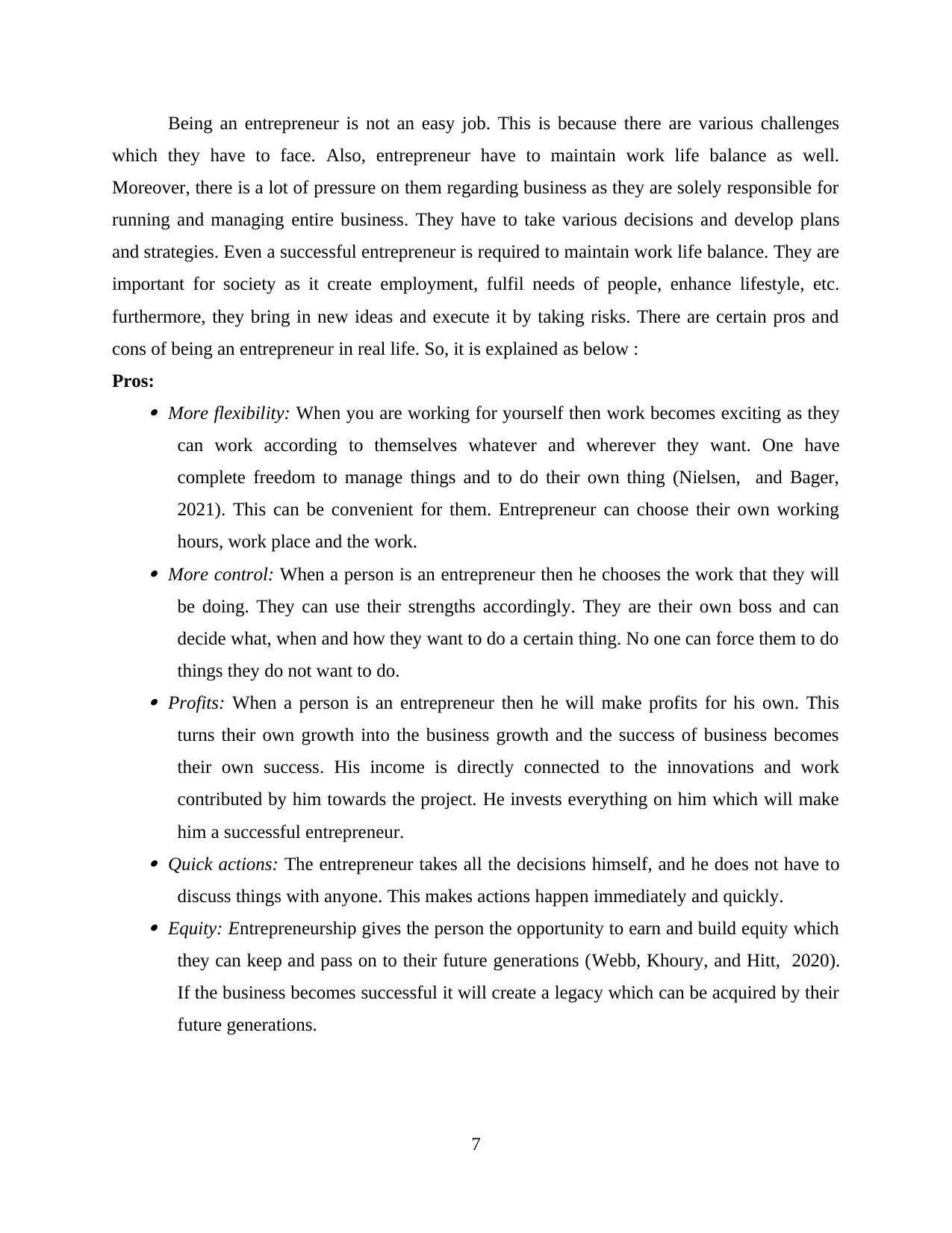
Being an entrepreneur is not an easy job. This is because there are various challenges
which they have to face. Also, entrepreneur have to maintain work life balance as well.
Moreover, there is a lot of pressure on them regarding business as they are solely responsible for
running and managing entire business. They have to take various decisions and develop plans
and strategies. Even a successful entrepreneur is required to maintain work life balance. They are
important for society as it create employment, fulfil needs of people, enhance lifestyle, etc.
furthermore, they bring in new ideas and execute it by taking risks. There are certain pros and
cons of being an entrepreneur in real life. So, it is explained as below :
Pros: More flexibility: When you are working for yourself then work becomes exciting as they
can work according to themselves whatever and wherever they want. One have
complete freedom to manage things and to do their own thing (Nielsen, and Bager,
2021). This can be convenient for them. Entrepreneur can choose their own working
hours, work place and the work. More control: When a person is an entrepreneur then he chooses the work that they will
be doing. They can use their strengths accordingly. They are their own boss and can
decide what, when and how they want to do a certain thing. No one can force them to do
things they do not want to do. Profits: When a person is an entrepreneur then he will make profits for his own. This
turns their own growth into the business growth and the success of business becomes
their own success. His income is directly connected to the innovations and work
contributed by him towards the project. He invests everything on him which will make
him a successful entrepreneur. Quick actions: The entrepreneur takes all the decisions himself, and he does not have to
discuss things with anyone. This makes actions happen immediately and quickly. Equity: Entrepreneurship gives the person the opportunity to earn and build equity which
they can keep and pass on to their future generations (Webb, Khoury, and Hitt, 2020).
If the business becomes successful it will create a legacy which can be acquired by their
future generations.
7
which they have to face. Also, entrepreneur have to maintain work life balance as well.
Moreover, there is a lot of pressure on them regarding business as they are solely responsible for
running and managing entire business. They have to take various decisions and develop plans
and strategies. Even a successful entrepreneur is required to maintain work life balance. They are
important for society as it create employment, fulfil needs of people, enhance lifestyle, etc.
furthermore, they bring in new ideas and execute it by taking risks. There are certain pros and
cons of being an entrepreneur in real life. So, it is explained as below :
Pros: More flexibility: When you are working for yourself then work becomes exciting as they
can work according to themselves whatever and wherever they want. One have
complete freedom to manage things and to do their own thing (Nielsen, and Bager,
2021). This can be convenient for them. Entrepreneur can choose their own working
hours, work place and the work. More control: When a person is an entrepreneur then he chooses the work that they will
be doing. They can use their strengths accordingly. They are their own boss and can
decide what, when and how they want to do a certain thing. No one can force them to do
things they do not want to do. Profits: When a person is an entrepreneur then he will make profits for his own. This
turns their own growth into the business growth and the success of business becomes
their own success. His income is directly connected to the innovations and work
contributed by him towards the project. He invests everything on him which will make
him a successful entrepreneur. Quick actions: The entrepreneur takes all the decisions himself, and he does not have to
discuss things with anyone. This makes actions happen immediately and quickly. Equity: Entrepreneurship gives the person the opportunity to earn and build equity which
they can keep and pass on to their future generations (Webb, Khoury, and Hitt, 2020).
If the business becomes successful it will create a legacy which can be acquired by their
future generations.
7
Paraphrase This Document
Need a fresh take? Get an instant paraphrase of this document with our AI Paraphraser
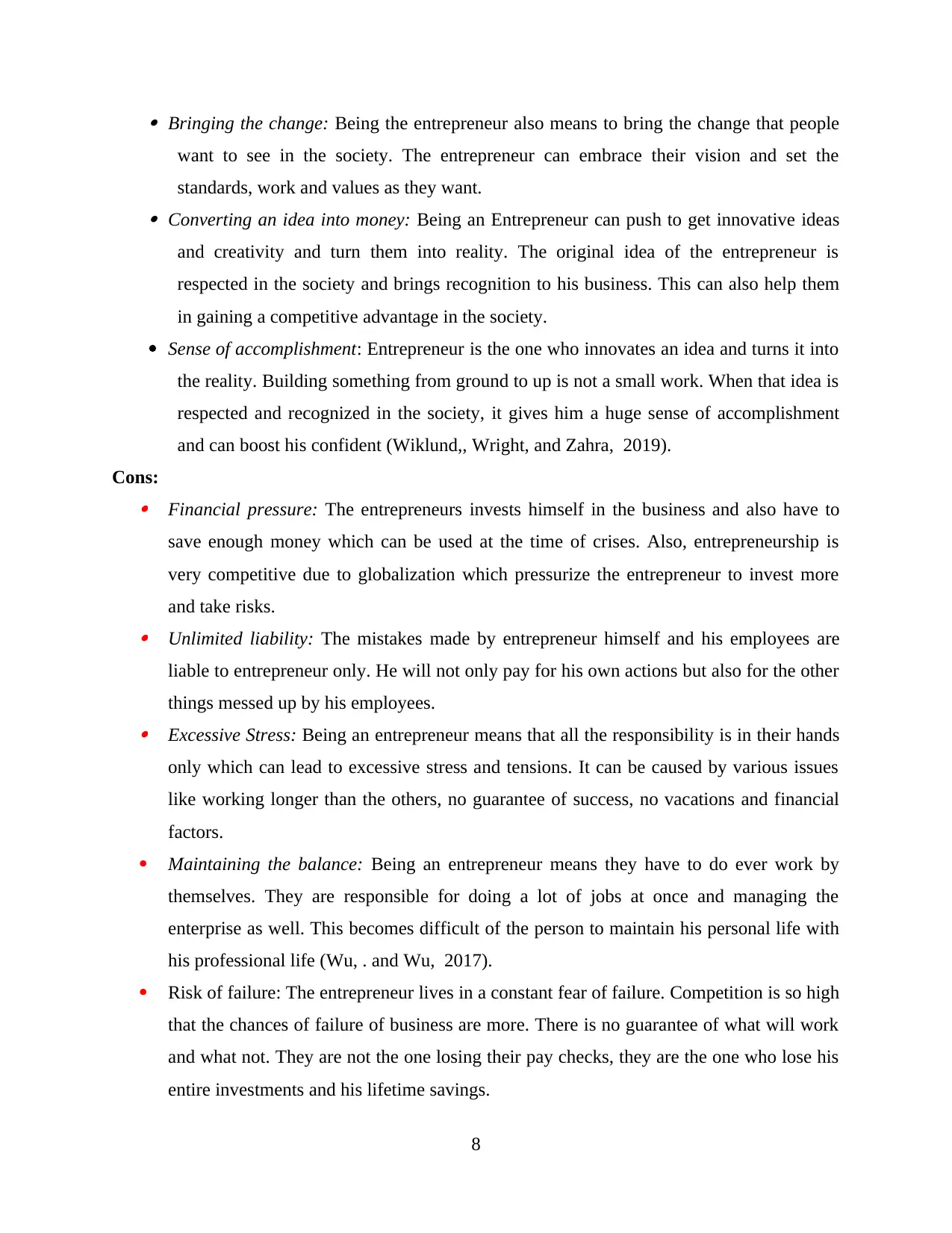
Bringing the change: Being the entrepreneur also means to bring the change that people
want to see in the society. The entrepreneur can embrace their vision and set the
standards, work and values as they want. Converting an idea into money: Being an Entrepreneur can push to get innovative ideas
and creativity and turn them into reality. The original idea of the entrepreneur is
respected in the society and brings recognition to his business. This can also help them
in gaining a competitive advantage in the society.
Sense of accomplishment: Entrepreneur is the one who innovates an idea and turns it into
the reality. Building something from ground to up is not a small work. When that idea is
respected and recognized in the society, it gives him a huge sense of accomplishment
and can boost his confident (Wiklund,, Wright, and Zahra, 2019).
Cons: Financial pressure: The entrepreneurs invests himself in the business and also have to
save enough money which can be used at the time of crises. Also, entrepreneurship is
very competitive due to globalization which pressurize the entrepreneur to invest more
and take risks. Unlimited liability: The mistakes made by entrepreneur himself and his employees are
liable to entrepreneur only. He will not only pay for his own actions but also for the other
things messed up by his employees. Excessive Stress: Being an entrepreneur means that all the responsibility is in their hands
only which can lead to excessive stress and tensions. It can be caused by various issues
like working longer than the others, no guarantee of success, no vacations and financial
factors.
Maintaining the balance: Being an entrepreneur means they have to do ever work by
themselves. They are responsible for doing a lot of jobs at once and managing the
enterprise as well. This becomes difficult of the person to maintain his personal life with
his professional life (Wu, . and Wu, 2017).
Risk of failure: The entrepreneur lives in a constant fear of failure. Competition is so high
that the chances of failure of business are more. There is no guarantee of what will work
and what not. They are not the one losing their pay checks, they are the one who lose his
entire investments and his lifetime savings.
8
want to see in the society. The entrepreneur can embrace their vision and set the
standards, work and values as they want. Converting an idea into money: Being an Entrepreneur can push to get innovative ideas
and creativity and turn them into reality. The original idea of the entrepreneur is
respected in the society and brings recognition to his business. This can also help them
in gaining a competitive advantage in the society.
Sense of accomplishment: Entrepreneur is the one who innovates an idea and turns it into
the reality. Building something from ground to up is not a small work. When that idea is
respected and recognized in the society, it gives him a huge sense of accomplishment
and can boost his confident (Wiklund,, Wright, and Zahra, 2019).
Cons: Financial pressure: The entrepreneurs invests himself in the business and also have to
save enough money which can be used at the time of crises. Also, entrepreneurship is
very competitive due to globalization which pressurize the entrepreneur to invest more
and take risks. Unlimited liability: The mistakes made by entrepreneur himself and his employees are
liable to entrepreneur only. He will not only pay for his own actions but also for the other
things messed up by his employees. Excessive Stress: Being an entrepreneur means that all the responsibility is in their hands
only which can lead to excessive stress and tensions. It can be caused by various issues
like working longer than the others, no guarantee of success, no vacations and financial
factors.
Maintaining the balance: Being an entrepreneur means they have to do ever work by
themselves. They are responsible for doing a lot of jobs at once and managing the
enterprise as well. This becomes difficult of the person to maintain his personal life with
his professional life (Wu, . and Wu, 2017).
Risk of failure: The entrepreneur lives in a constant fear of failure. Competition is so high
that the chances of failure of business are more. There is no guarantee of what will work
and what not. They are not the one losing their pay checks, they are the one who lose his
entire investments and his lifetime savings.
8
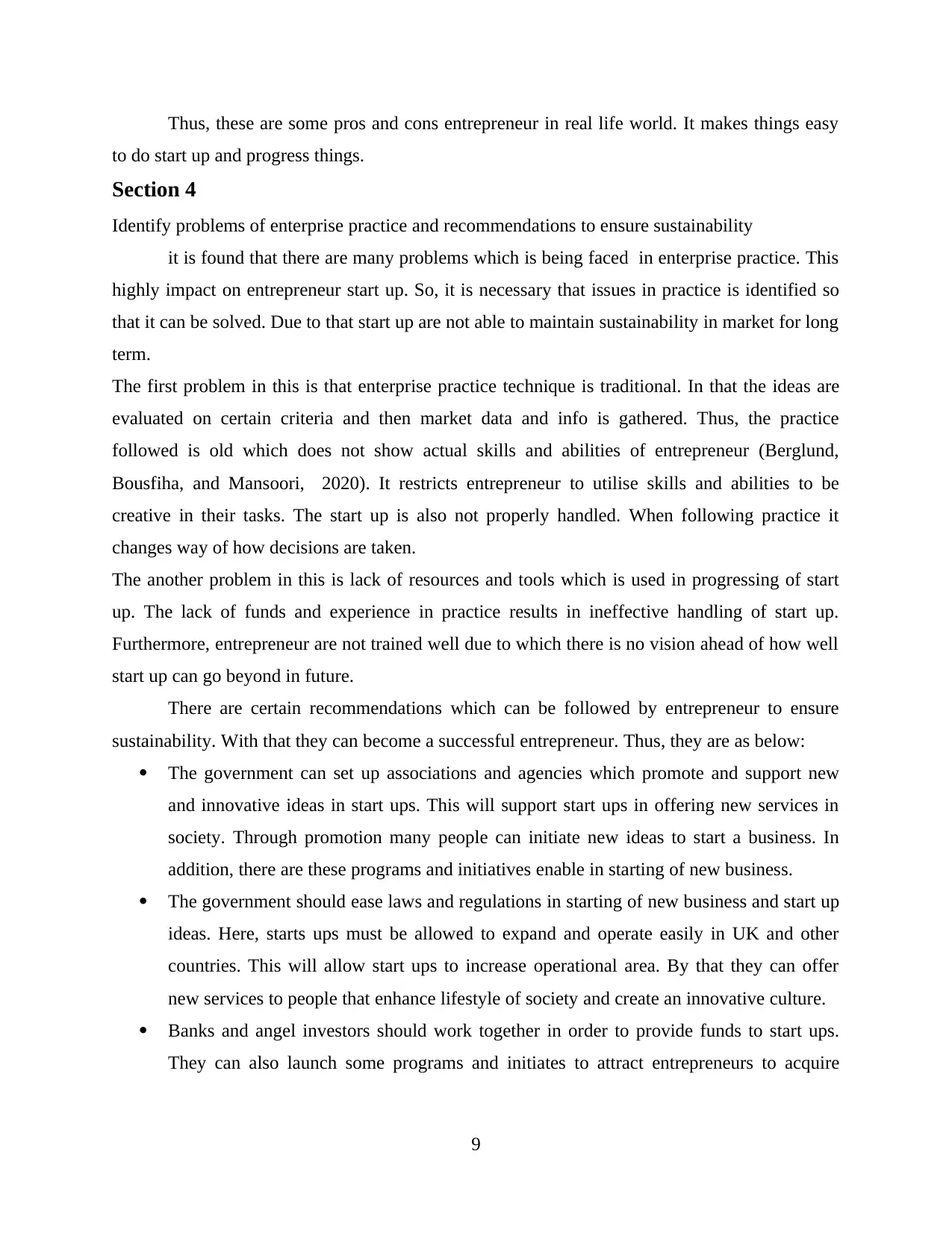
Thus, these are some pros and cons entrepreneur in real life world. It makes things easy
to do start up and progress things.
Section 4
Identify problems of enterprise practice and recommendations to ensure sustainability
it is found that there are many problems which is being faced in enterprise practice. This
highly impact on entrepreneur start up. So, it is necessary that issues in practice is identified so
that it can be solved. Due to that start up are not able to maintain sustainability in market for long
term.
The first problem in this is that enterprise practice technique is traditional. In that the ideas are
evaluated on certain criteria and then market data and info is gathered. Thus, the practice
followed is old which does not show actual skills and abilities of entrepreneur (Berglund,
Bousfiha, and Mansoori, 2020). It restricts entrepreneur to utilise skills and abilities to be
creative in their tasks. The start up is also not properly handled. When following practice it
changes way of how decisions are taken.
The another problem in this is lack of resources and tools which is used in progressing of start
up. The lack of funds and experience in practice results in ineffective handling of start up.
Furthermore, entrepreneur are not trained well due to which there is no vision ahead of how well
start up can go beyond in future.
There are certain recommendations which can be followed by entrepreneur to ensure
sustainability. With that they can become a successful entrepreneur. Thus, they are as below:
The government can set up associations and agencies which promote and support new
and innovative ideas in start ups. This will support start ups in offering new services in
society. Through promotion many people can initiate new ideas to start a business. In
addition, there are these programs and initiatives enable in starting of new business.
The government should ease laws and regulations in starting of new business and start up
ideas. Here, starts ups must be allowed to expand and operate easily in UK and other
countries. This will allow start ups to increase operational area. By that they can offer
new services to people that enhance lifestyle of society and create an innovative culture.
Banks and angel investors should work together in order to provide funds to start ups.
They can also launch some programs and initiates to attract entrepreneurs to acquire
9
to do start up and progress things.
Section 4
Identify problems of enterprise practice and recommendations to ensure sustainability
it is found that there are many problems which is being faced in enterprise practice. This
highly impact on entrepreneur start up. So, it is necessary that issues in practice is identified so
that it can be solved. Due to that start up are not able to maintain sustainability in market for long
term.
The first problem in this is that enterprise practice technique is traditional. In that the ideas are
evaluated on certain criteria and then market data and info is gathered. Thus, the practice
followed is old which does not show actual skills and abilities of entrepreneur (Berglund,
Bousfiha, and Mansoori, 2020). It restricts entrepreneur to utilise skills and abilities to be
creative in their tasks. The start up is also not properly handled. When following practice it
changes way of how decisions are taken.
The another problem in this is lack of resources and tools which is used in progressing of start
up. The lack of funds and experience in practice results in ineffective handling of start up.
Furthermore, entrepreneur are not trained well due to which there is no vision ahead of how well
start up can go beyond in future.
There are certain recommendations which can be followed by entrepreneur to ensure
sustainability. With that they can become a successful entrepreneur. Thus, they are as below:
The government can set up associations and agencies which promote and support new
and innovative ideas in start ups. This will support start ups in offering new services in
society. Through promotion many people can initiate new ideas to start a business. In
addition, there are these programs and initiatives enable in starting of new business.
The government should ease laws and regulations in starting of new business and start up
ideas. Here, starts ups must be allowed to expand and operate easily in UK and other
countries. This will allow start ups to increase operational area. By that they can offer
new services to people that enhance lifestyle of society and create an innovative culture.
Banks and angel investors should work together in order to provide funds to start ups.
They can also launch some programs and initiates to attract entrepreneurs to acquire
9
⊘ This is a preview!⊘
Do you want full access?
Subscribe today to unlock all pages.

Trusted by 1+ million students worldwide
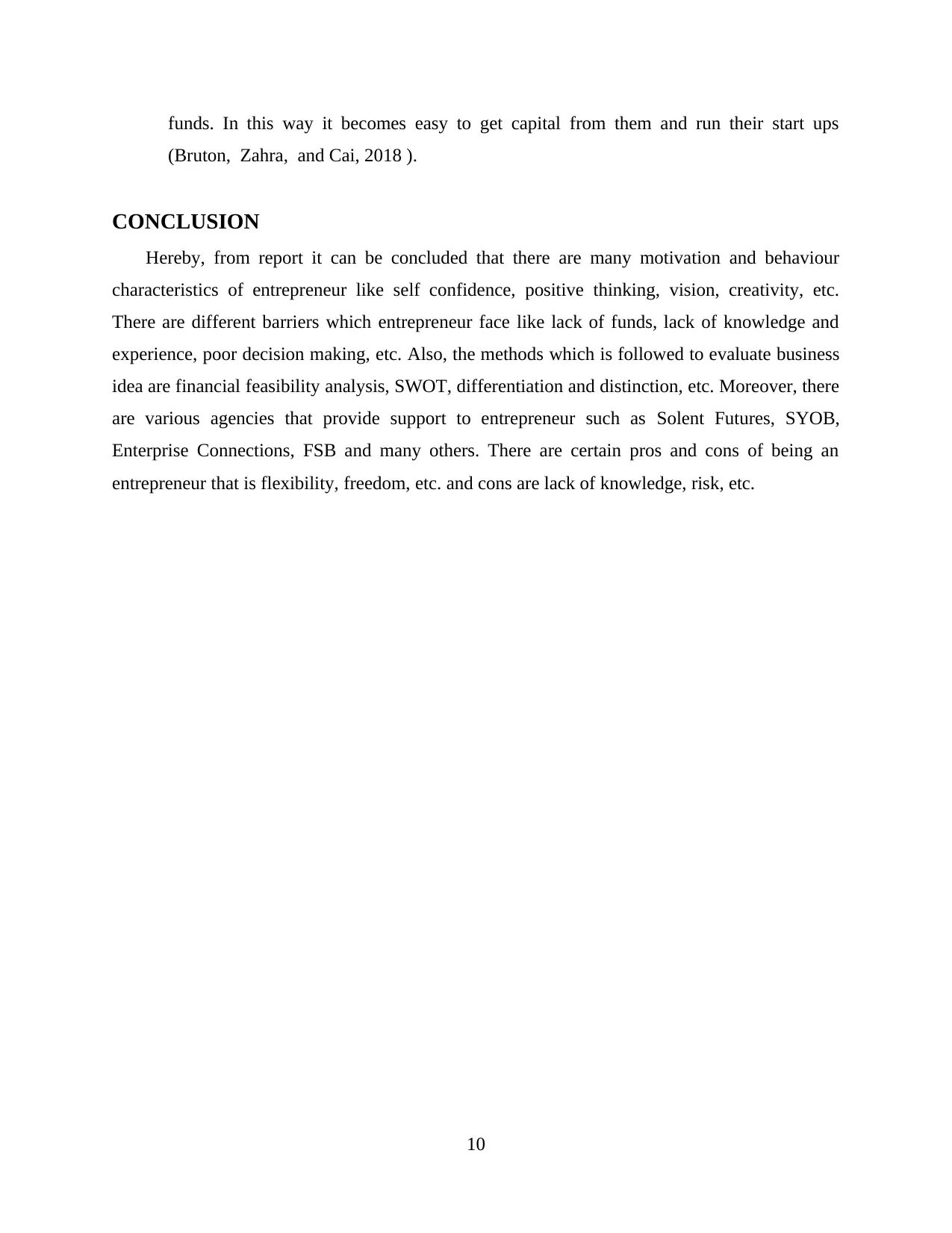
funds. In this way it becomes easy to get capital from them and run their start ups
(Bruton, Zahra, and Cai, 2018 ).
CONCLUSION
Hereby, from report it can be concluded that there are many motivation and behaviour
characteristics of entrepreneur like self confidence, positive thinking, vision, creativity, etc.
There are different barriers which entrepreneur face like lack of funds, lack of knowledge and
experience, poor decision making, etc. Also, the methods which is followed to evaluate business
idea are financial feasibility analysis, SWOT, differentiation and distinction, etc. Moreover, there
are various agencies that provide support to entrepreneur such as Solent Futures, SYOB,
Enterprise Connections, FSB and many others. There are certain pros and cons of being an
entrepreneur that is flexibility, freedom, etc. and cons are lack of knowledge, risk, etc.
10
(Bruton, Zahra, and Cai, 2018 ).
CONCLUSION
Hereby, from report it can be concluded that there are many motivation and behaviour
characteristics of entrepreneur like self confidence, positive thinking, vision, creativity, etc.
There are different barriers which entrepreneur face like lack of funds, lack of knowledge and
experience, poor decision making, etc. Also, the methods which is followed to evaluate business
idea are financial feasibility analysis, SWOT, differentiation and distinction, etc. Moreover, there
are various agencies that provide support to entrepreneur such as Solent Futures, SYOB,
Enterprise Connections, FSB and many others. There are certain pros and cons of being an
entrepreneur that is flexibility, freedom, etc. and cons are lack of knowledge, risk, etc.
10
Paraphrase This Document
Need a fresh take? Get an instant paraphrase of this document with our AI Paraphraser
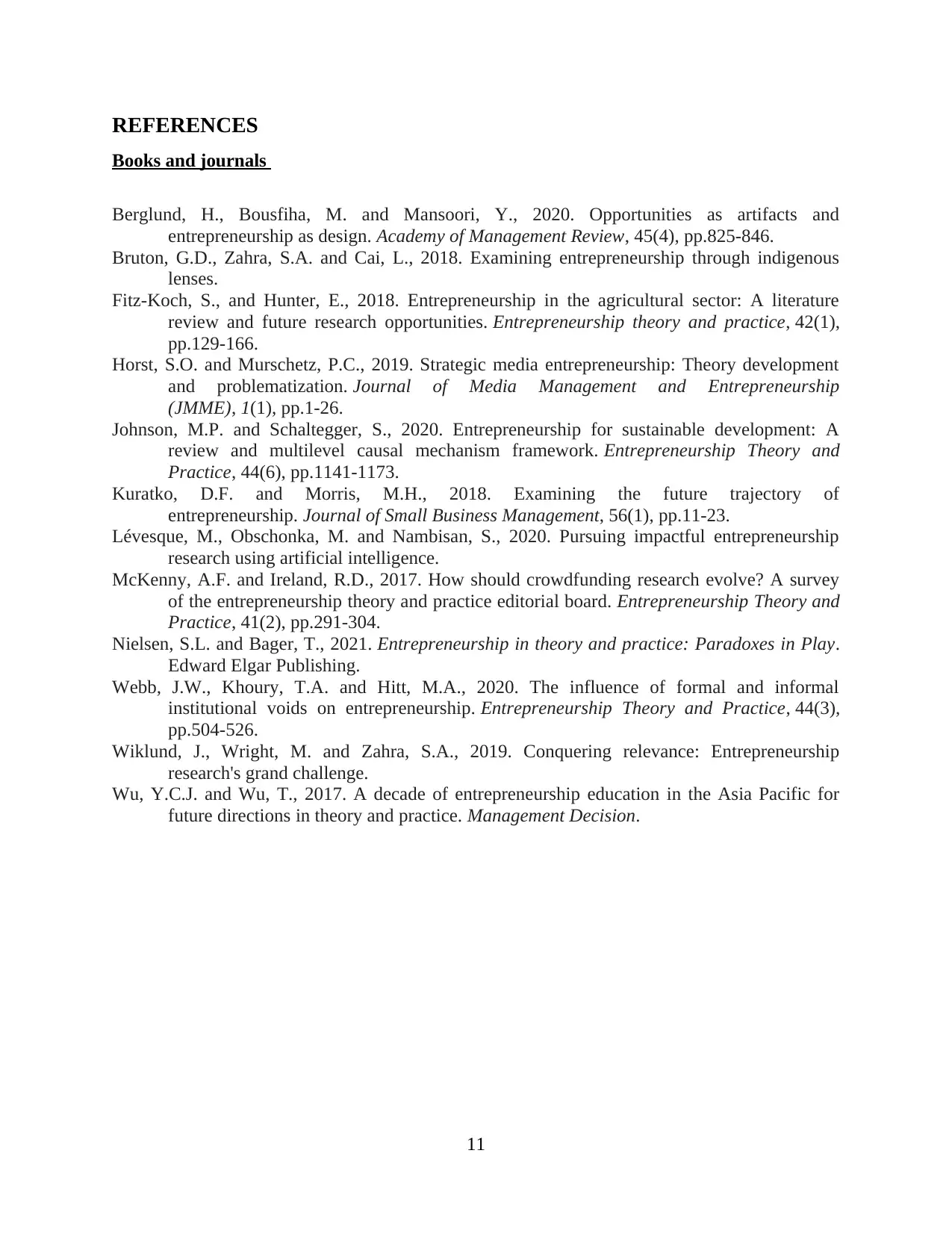
REFERENCES
Books and journals
Berglund, H., Bousfiha, M. and Mansoori, Y., 2020. Opportunities as artifacts and
entrepreneurship as design. Academy of Management Review, 45(4), pp.825-846.
Bruton, G.D., Zahra, S.A. and Cai, L., 2018. Examining entrepreneurship through indigenous
lenses.
Fitz-Koch, S., and Hunter, E., 2018. Entrepreneurship in the agricultural sector: A literature
review and future research opportunities. Entrepreneurship theory and practice, 42(1),
pp.129-166.
Horst, S.O. and Murschetz, P.C., 2019. Strategic media entrepreneurship: Theory development
and problematization. Journal of Media Management and Entrepreneurship
(JMME), 1(1), pp.1-26.
Johnson, M.P. and Schaltegger, S., 2020. Entrepreneurship for sustainable development: A
review and multilevel causal mechanism framework. Entrepreneurship Theory and
Practice, 44(6), pp.1141-1173.
Kuratko, D.F. and Morris, M.H., 2018. Examining the future trajectory of
entrepreneurship. Journal of Small Business Management, 56(1), pp.11-23.
Lévesque, M., Obschonka, M. and Nambisan, S., 2020. Pursuing impactful entrepreneurship
research using artificial intelligence.
McKenny, A.F. and Ireland, R.D., 2017. How should crowdfunding research evolve? A survey
of the entrepreneurship theory and practice editorial board. Entrepreneurship Theory and
Practice, 41(2), pp.291-304.
Nielsen, S.L. and Bager, T., 2021. Entrepreneurship in theory and practice: Paradoxes in Play.
Edward Elgar Publishing.
Webb, J.W., Khoury, T.A. and Hitt, M.A., 2020. The influence of formal and informal
institutional voids on entrepreneurship. Entrepreneurship Theory and Practice, 44(3),
pp.504-526.
Wiklund, J., Wright, M. and Zahra, S.A., 2019. Conquering relevance: Entrepreneurship
research's grand challenge.
Wu, Y.C.J. and Wu, T., 2017. A decade of entrepreneurship education in the Asia Pacific for
future directions in theory and practice. Management Decision.
11
Books and journals
Berglund, H., Bousfiha, M. and Mansoori, Y., 2020. Opportunities as artifacts and
entrepreneurship as design. Academy of Management Review, 45(4), pp.825-846.
Bruton, G.D., Zahra, S.A. and Cai, L., 2018. Examining entrepreneurship through indigenous
lenses.
Fitz-Koch, S., and Hunter, E., 2018. Entrepreneurship in the agricultural sector: A literature
review and future research opportunities. Entrepreneurship theory and practice, 42(1),
pp.129-166.
Horst, S.O. and Murschetz, P.C., 2019. Strategic media entrepreneurship: Theory development
and problematization. Journal of Media Management and Entrepreneurship
(JMME), 1(1), pp.1-26.
Johnson, M.P. and Schaltegger, S., 2020. Entrepreneurship for sustainable development: A
review and multilevel causal mechanism framework. Entrepreneurship Theory and
Practice, 44(6), pp.1141-1173.
Kuratko, D.F. and Morris, M.H., 2018. Examining the future trajectory of
entrepreneurship. Journal of Small Business Management, 56(1), pp.11-23.
Lévesque, M., Obschonka, M. and Nambisan, S., 2020. Pursuing impactful entrepreneurship
research using artificial intelligence.
McKenny, A.F. and Ireland, R.D., 2017. How should crowdfunding research evolve? A survey
of the entrepreneurship theory and practice editorial board. Entrepreneurship Theory and
Practice, 41(2), pp.291-304.
Nielsen, S.L. and Bager, T., 2021. Entrepreneurship in theory and practice: Paradoxes in Play.
Edward Elgar Publishing.
Webb, J.W., Khoury, T.A. and Hitt, M.A., 2020. The influence of formal and informal
institutional voids on entrepreneurship. Entrepreneurship Theory and Practice, 44(3),
pp.504-526.
Wiklund, J., Wright, M. and Zahra, S.A., 2019. Conquering relevance: Entrepreneurship
research's grand challenge.
Wu, Y.C.J. and Wu, T., 2017. A decade of entrepreneurship education in the Asia Pacific for
future directions in theory and practice. Management Decision.
11
1 out of 11
Related Documents
Your All-in-One AI-Powered Toolkit for Academic Success.
+13062052269
info@desklib.com
Available 24*7 on WhatsApp / Email
![[object Object]](/_next/static/media/star-bottom.7253800d.svg)
Unlock your academic potential
Copyright © 2020–2025 A2Z Services. All Rights Reserved. Developed and managed by ZUCOL.





